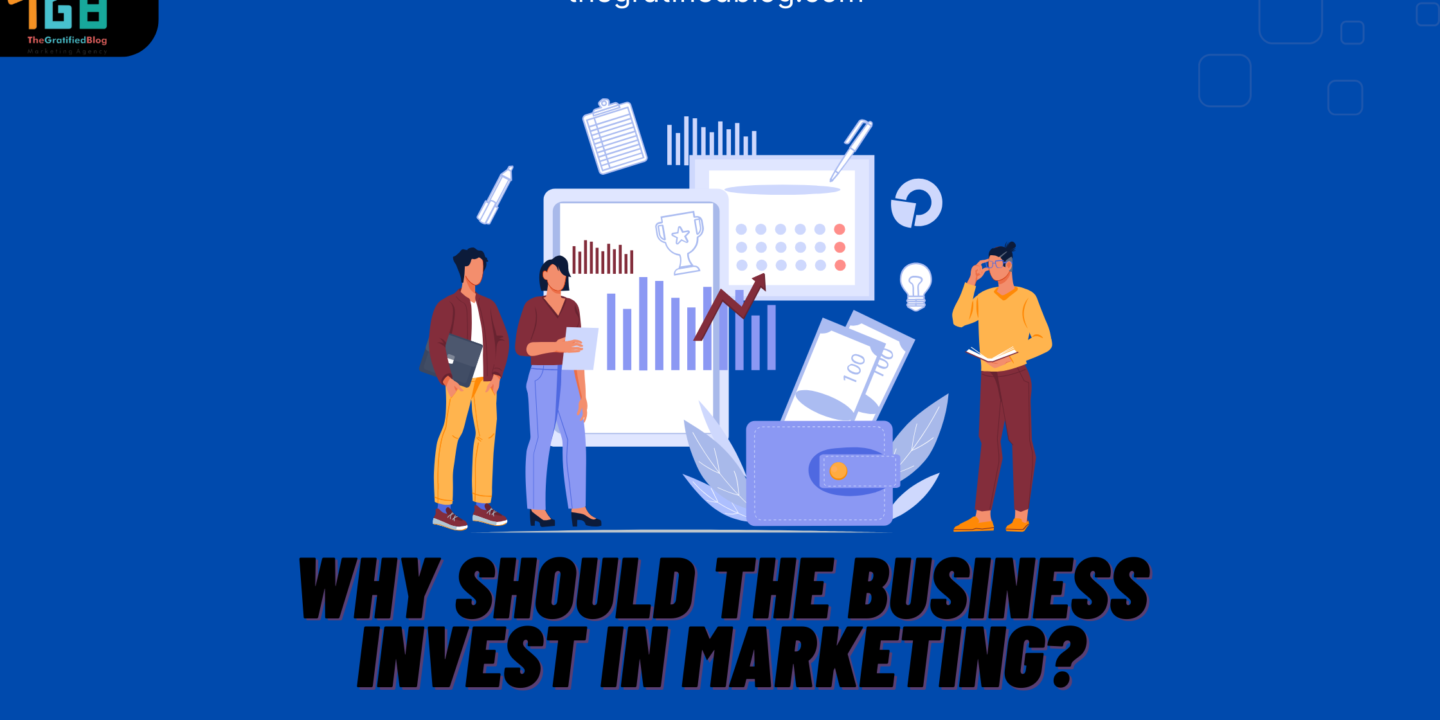
In the current competitive business environment, marketing has become an indispensable tool for success. No matter how brilliant your product or service might be, it will only matter if your target audience knows about it. That’s where “Why Should The Business Invest In Marketing?” comes into play. In this blog, we will explore the business marketing concept and dive into the five key benefits of investing in it. We will also discuss eight compelling reasons why your business should allocate resources to marketing.
What Is Business Marketing?
Business marketing is a strategic process of advertising and selling products or services to fellow businesses, centering on corporate clients’ distinct requirements and preferences rather than individual consumers.
This practice involves building strong B2B relationships through various channels, including advertising, sales, and digital marketing. Business marketing is driven by market research, competitive analysis, and targeted marketing strategies.
Its primary goal is to enhance brand visibility, generate leads, and foster long-term partnerships. Effective B2B marketing often emphasizes the value, cost-efficiency, and quality of the offerings to meet the specific demands of businesses.
It plays a crucial part in fostering growth and sustainability in the corporate world, aligning products and services with the needs of other enterprises.
What Should A Business Invest In Marketing?
A successful business should invest in Developing marketing strategies that align with its objectives and resonate effectively with its target audience. This includes digital marketing, website optimization, social media advertising, and email campaigns to reach a broad online audience.
Content marketing can establish expertise and engage customers through blogs and informative articles. Allocating resources to track and analyze marketing data ensures a data-driven approach, while investing in customer relationship management tools can enhance customer retention and loyalty.
A diversified marketing portfolio should cater to the unique needs of the business and its customer base. Marketing investments should prioritize:
- Digital Presence: A solid online presence is crucial, encompassing a well-designed website and engaging social media profiles to connect with a broader audience.
- Content Strategy: Invest in content creation and distribution to establish authority and provide value, whether through blog posts, videos, or other relevant content.
- Advertising: Allocate funds to strategic advertising campaigns, including pay-per-click (PPC) advertising, to reach potential customers where they spend their time online.
- Market Research: Continuously invest in market research to understand consumer trends and preferences, enabling the development of effective marketing strategies that resonate with your target market.
Five Benefits Of Investing In Business Marketing

Increased Visibility
Practical marketing efforts increase your brand’s visibility in the market. By reaching out to your target audience through various channels, you can create awareness and establish a presence within the consciousness of potential Customers. An effectively implemented marketing campaign can enhance your brand, stand out, and be remembered.
Customer Engagement
Through marketing, you can actively connect with your customers. Both current and prospective. Building relationships with your audience through content, social media, and personalized interactions can lead to customer loyalty and long-term success. Customers who are actively involved are more inclined to become advocates for the brand and repeat buyers.
Competitive Advantage
A well-thought-out marketing strategy can give you a competitive edge in your industry. You can distinguish yourself from competitors by Emphasizing your distinctive selling points and demonstrating the advantages of your product or service product or service. Effective marketing can help you win the trust of your target market.
Business Growth
Marketing directly contributes to business growth by driving sales and revenue. Increased visibility and engagement can attract a more extensive customer base and increase profits. This growth enables you to invest in further product development, expansion, and innovation.
Data-Driven Decision-Making
Marketing provides valuable data and gains an understanding of consumer behavior, market trends, and the efficacy of your offerings’ campaigns. Examining this data empowers you to make informed decisions and adapt your strategy to meet your customers’ needs better. This data-driven approach is crucial for staying relevant and thriving in the market.
Why Should The Business Invest In Marketing?

Investing in marketing is crucial for businesses of all sizes and industries, and there are eight key reasons to support this strategic move. It is an essential component of a company’s overall strategy for growth and success, and these reasons to invest in marketing can significantly impact the bottom line.
Brand Building: Effective marketing efforts help build and strengthen your brand, creating a positive image and reputation in the minds of consumers. This positive perception instills trust and credibility and sets you apart from competitors.
A well-established brand leads to increased customer loyalty and the capacity to demand higher prices for your products or services. It also facilitates expansion into new markets and diversification of offerings.
A strong brand is an asset that can attract investors and partnerships, paving the way for long-term growth and profitability. In today’s competitive business landscape, investing in marketing for brand building is essential for sustained success and market relevance.
Customer Acquisition: Marketing is instrumental in acquiring new customers and expanding your customer base. It enables businesses to broaden their reach and allure a broader audience of potential clients who may need to know about their products or services.
Effective marketing strategies allow for targeted outreach, Ensuring that you engage with individuals genuinely interested in what your business offers. That boosts sales and fosters brand recognition and loyalty, leading to long-term customer relationships.
A well-executed marketing plan Can distinguish your business from competitors and build a robust market presence. In today’s competitive landscape, investing in marketing is essential for sustainable growth and the continued success of your enterprise.
Customer Retention: Maintaining current customers proves to be a more cost-efficient approach than acquiring new ones. Marketing helps nurture existing customer relationships, fostering brand loyalty and repeat business.
By maintaining a solid connection with loyal patrons, businesses can benefit from recurring sales and increased customer lifetime value. Effective marketing strategies, such as personalized promotions and tailored communication, can keep customers engaged and satisfied.
That, in turn, bolsters a company’s reputation, as happy customers often become brand advocates. Through ongoing marketing efforts, businesses can tap into a reliable revenue stream while simultaneously reducing the expenses of acquiring new customers.
Investing in marketing for customer retention is a smart long-term strategy that secures sustainable profitability.
Product Promotion: Marketing is essential for introducing new products, features, or services. It provides the means to create awareness and generate interest among potential customers.
Effective marketing strategies can highlight the unique selling points of a product, emphasize its benefits, and showcase how it meets the target audience’s needs. This promotion helps a business stand out in a competitive landscape, making gaining a foothold and securing market share easier.
Consistent marketing efforts can build brand recognition and loyalty, increasing customer retention and repeat sales. Investing in marketing ensures that a business remains relevant, adaptable, and competitive in a dynamic market environment.
Adaptation to Market Changes: As market trends evolve, marketing can help you adapt and respond effectively to changing consumer preferences. By investing in marketing, businesses can stay attuned. Adapting to changes in customer behavior enables them to tailor their products and services accordingly.
This flexibility ensures that a company remains relevant and competitive in a dynamic business landscape. Marketing provides invaluable insights into emerging trends, proactively enabling businesses to position themselves in emerging markets.
A company can seize opportunities through strategic marketing efforts, optimize product offerings, and maintain a strong market presence. Investing in marketing safeguards against obsolescence, fostering resilience and sustained growth in the face of ever-changing market conditions.
Industry Leadership: By showcasing your expertise and thought leadership, marketing can position your business as an industry leader. This elevated status fosters credibility and attracts more customers and partners.
As a recognized authority, your business can command higher prices and enjoy a competitive edge, resulting in increased revenue and market share. Effective marketing strategies help you stay ahead of the competition, adapting to evolving trends and customer needs.
Industry leadership can also lead to valuable collaborations and networking opportunities, expanding your reach and influence within your sector. Investing in marketing, therefore, is a strategic move that can propel sustained success and expansion for your business.
Improved ROI: Effective marketing can provide a significant return on investment (ROI) by increasing sales and revenue. Investing in marketing efforts allows a business to reach a larger audience, attract potential customers, and build brand awareness.
Consequently, this can result in elevated sales and expanded market share, ultimately driving profitability. Well-planned marketing strategies help target the right audience, reduce wasteful spending, and maximize the impact of each marketing dollar spent.
In a competitive marketplace, a strong marketing presence sets a business apart from its rivals, ensuring long-term success and growth. By fostering customer loyalty and trust, marketing investments lay the foundation for sustainable business development and ongoing success, making it a crucial component of any business strategy.
Risk Mitigation: Diversifying your marketing efforts across multiple channels can help mitigate the risk of depending on a single source of revenue. By investing in marketing, businesses can reach a broader audience, reducing the vulnerability to market fluctuations.
Marketing allows data-driven decision-making, enabling companies to adapt swiftly to changing consumer preferences and industry trends. It builds brand awareness and trust, making weathering crises easier and maintaining customer loyalty.
Effective marketing also aids in understanding and staying ahead of the competition, ensuring long-term viability. Marketing is an essential investment for any business, as it hedges against uncertainty, nurtures growth, and fosters resilience in an ever-evolving marketplace.
Conclusion
Investing in business marketing is crucial for any organization thriving in today’s competitive market. Marketing aims to offer several benefits, from increased visibility and customer engagement to driving business growth and facilitating data-driven decision-making.
With brand building, customer acquisition, and the ability to adapt to market changes, marketing becomes a strategic cornerstone for success.
By recognizing the importance of marketing and committing resources, your business can effectively position itself for long-term growth and profitability in an ever-evolving marketplace.








No Comments